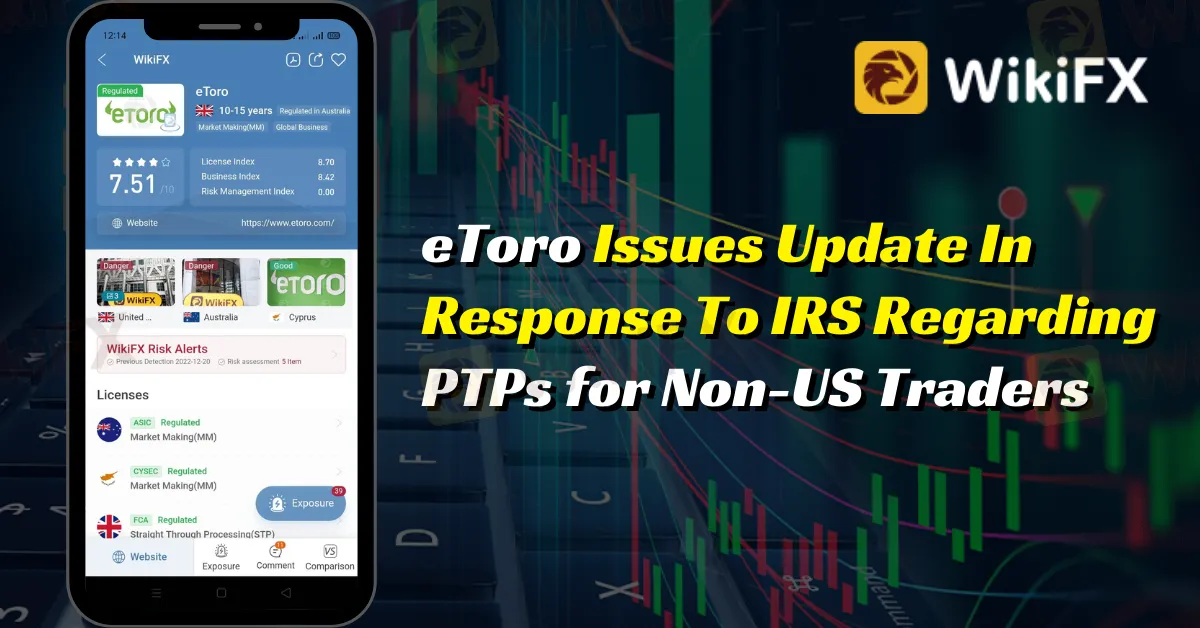简体中文
繁體中文
English
Pусский
日本語
ภาษาไทย
Tiếng Việt
Bahasa Indonesia
Español
हिन्दी
Filippiiniläinen
Français
Deutsch
Português
Türkçe
한국어
العربية
eToro Issues Update In Response To IRS Regarding PTPs for Non-US Traders
Abstract:eToro, an online broker, has released an update on publicly listed partnerships (PTPs). Non-US customers will no longer be able to trade the underlying assets of Publicly Traded Partnerships (PTPs) on eToro.

eToro, an online broker, has released an update on publicly listed partnerships (PTPs). Non-US customers will no longer be able to trade the underlying assets of Publicly Traded Partnerships (PTPs) on eToro.
This adjustment is being made in response to the IRS's new Internal Revenue Code Section 1446(f), which takes effect on January 1, 2023. It has an influence on the revenues from the sale of PTPs owned by non-US tax residents.
All sales become subject to a 10% withholding tax. This withholding tax implies that if you close a $10,000 position, even if no profit is earned, you will be subject to a $1,000 withholding tax. As a consequence, you would get $9,000 in compensation.
Due to the tax responsibilities of retaining and managing these assets, eToro will no longer provide 'real' investments in PTPs. The business requests that you close any open real holdings in PTPs before the end of the market on December 26, 2022.
If the aforementioned conditions are not met, eToro will liquidate any (relevant) remaining shares on December 28, 2022.
Existing roles have been reclassified as *Close Only*. *Close Only* indicates that new 'BUY' positions on the underlying asset cannot be opened, but current ones may be closed. Users who want to acquire exposure to PTPs will still be able to do so by opening CFD positions.
About eToro
eToro provides an innovative trading platform that is distinguished by a one-of-a-kind social trading experience. Users may study and mimic the trades of more experienced investors for crypto, stock, and ETF assets using eToro's social trading network. The platform shines with an easy-to-use website design that allows investors to readily choose traders to follow or rapidly make their own trades on the platform. eToro is available in over 140 countries, demonstrating the platform's capacity to appeal to a wide spectrum of consumers.

However, eToro is not accessible to investors in all states in the United States. Despite the fact that eToro has recently released an app for options trading for US users exclusively, its platform still lacks many of the tools and features seen in more complete trading experiences, limiting the site's utility to more skilled investors. The service is best suited to traders who desire a social and crypto emphasis, but those looking for more will likely find rival online brokers more suitable.
You can find out more about eToro news here: https://www.wikifx.com/en/dealer/0001283907.html

Stay tuned for more Forex Broker news.
Use the download link below to download and install the WikiFX App to get notified of the latest news even on the go.
Download link: https://www.wikifx.com/en/download.html

Disclaimer:
The views in this article only represent the author's personal views, and do not constitute investment advice on this platform. This platform does not guarantee the accuracy, completeness and timeliness of the information in the article, and will not be liable for any loss caused by the use of or reliance on the information in the article.
Read more

Alleged Concerns with TradeEU.global's Trading Practices
An individual trader has come forward with allegations of an unfavourable experience while using the services of the broker TradeEU.global.

Lured by False Promises: Malaysian Driver Lost RM218K to an Investment Scam
A 49-year-old e-hailing driver in Malaysia fell victim to a fraudulent investment scheme, losing RM218,000 in a matter of weeks. The scheme, which falsely promised returns of 3 to 5 per cent within just three days, left the individual financially devastated.

SFC Freezes $91M in Client Accounts Amid Fraud Probe
SFC freezes $91M in client accounts at IBHK, SBI, Monmonkey, and Soochow over suspected hacking and market manipulation during unauthorized online trades.

Italian Regulator Warns Against 5 Websites
The Italian regulator, CONSOB has issued a warning against five websites offering unauthorized financial services. This regulatory action aims to protect the public from fraudulent activities.
WikiFX Broker
Latest News
What Makes Cross-Border Payments Easier Than Ever?
Trader Exposes Unethical Practices by STP Trading
Saxo & Portuguese Bank Partnership
SEC Fines Broker-Dealers $275K for Incomplete SAR Filings
Lured by False Promises: Malaysian Driver Lost RM218K to an Investment Scam
FTX Sets March 2025 Timeline for Creditor Payouts: What It Means for Investors
Italian Regulator Warns Against 5 Websites
Mastercard's 2030 Vision: Biometric-Driven, Tokenized Payments
SFC Freezes $91M in Client Accounts Amid Fraud Probe
Bybit Launches Gold & FX Treasure Hunt with Real Gold Rewards
Currency Calculator


